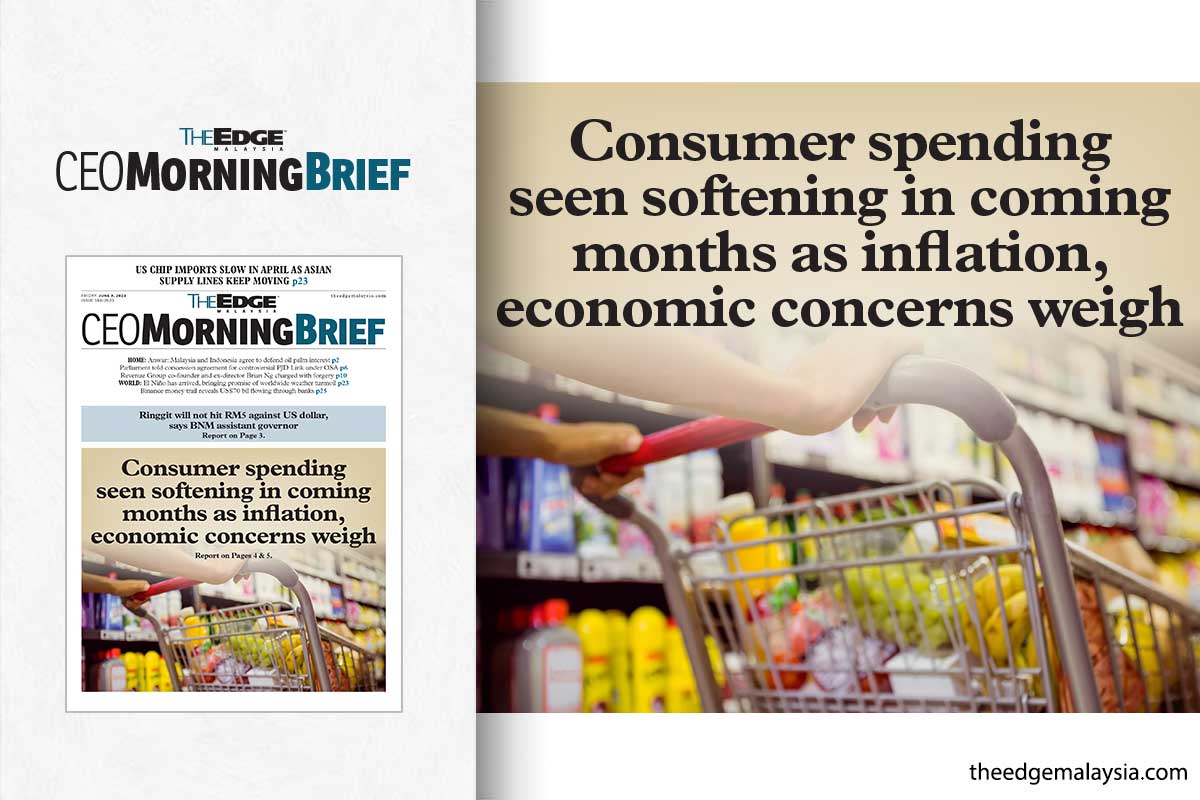
KUALA LUMPUR (June 9): While retail trade continued its double-digit growth trend for the first three months of this year, it was in stark contrast to the drop in consumer sentiment recorded in the same period, and the largely disappointing corporate earnings reported by consumer-related companies on Bursa Malaysia.
Indeed, the latest March retail trade data released last month by the Department of Statistics Malaysia marked the 14th straight month of double-digit growth since February 2022, but at a slower pace of 17.7% compared with February's 19.2% and January's 21.7%.
While the double-digit growth is still notable, economists said the latest figure should be considered in the context of the low base in the year-ago quarter when economic activities were still affected by lockdown disruptions and consumer spending had yet to recover.
Meanwhile, consumer sentiment, as measured by the Consumer Sentiments Index (CSI) produced by Malaysian Institute of Economic Research, fell below the 100-point optimism threshold to 99.2 points for the 1Q2023 period, down 9.7 points from 108.9 points in March 2022, and 6.1 points lower than 4Q2022's 105.3 points. The index, compiled by MIER using a quarterly survey conducted to gauge consumer spending trends and sentiments.
“MIER's CSI fell because some components of the index did not perform well. Specifically, expected job prospects and income pulled the measure down. Also, households were anxious about inflationary expectations. These factors weighed on the index,” Dr Shankaran Nambiar, senior research fellow at the Malaysian Institute of Economic Research or MIER, told The Edge.
The CSI is a gauge of forward-looking expectations that reflect consumers' anticipation or concerns. So, a deterioration in the index means consumers are wary about upcoming risks to the economy, such as recession and rising costs of living. Hence, it indicates consumers may be more mindful of their spending, going forward.
“The MIER CSI has fallen to below 100 points, and notice how DOSM’s [retail trade data] dissipating base effects have appeared to take shape. The lack of growth catalyst, unlike Malaysia's post-pandemic economic reopening, is also a factor in why things are moving the way they do now,” said Bank Islam chief economist Firdaos Rosli.
Stable job market, tourist arrivals to mitigate slowdown
Economists The Edge spoke to expect growth in consumer spending to moderate in the next six to 12 months amid multiple headwinds ahead that would curb demand, but a stable job market and rising tourist arrivals will mitigate the slowdown.
“Naturally, consumers would be quite guarded in their spending plans as higher cost of living would make them more mindful of their budget. But I do not think consumer spending would decelerate sharply as the labour market condition is still conducive. It’s more like a normalisation of the growth trend, since we saw 11.3% growth in private consumption last year — which was way above the [average] growth of 7%. My estimates for private consumption growth this year is around 5.8% and 6%,” said Bank Muamalat Malaysia Bhd chief economist and social finance head Dr Mohd Afzanizam Abdul Rashid.
AHAM Capital said the era of "revenge" spending fuelled by measures such as Employees Provident Fund (EPF) withdrawals, loan moratoriums and government handouts are over. That, coupled with the rise in overnight policy rate to 3% this year, could dampen consumer spending.
“Furthermore, the cost of doing business is on the rise, resulting in higher prices for consumers. Factors such as increased utility costs and higher minimum wages have contributed to this upward pressure. The government's decision to lift subsidies on chicken and eggs in July may also lead to higher prices if commodity prices persist at stubbornly high levels.
“A notable trend among major retailers is the phenomenon of down-trading, wherein consumers are opting for lower-priced and smaller-packaged items. This shift reflects a moderation in consumption. The recent weakening of the ringgit against other currencies has further exacerbated the situation, as imported goods become more expensive," the asset management firm said.
Things could turn out differently if the ringgit strengthens, with a pause in OPR hikes, which may alleviate some of the inflationary pressures on household budgets, AHAM Capital noted.
The factors that could affect the consumers’ spending outlook are greater-than-expected inflationary pressure that reduces consumers' spending ability, a higher-than-expected interest rate hike, and weaker-than-expected labour and wages prospects, said MIDF Research analyst Genevieve Ng Pei Fen.
Ng is positive about consumer spending on essential items with competitive pricing. “We think that demand for F&B [food and beverage], poultry, and consumer-staple retailers should remain stable in the near term. The increase in tourist movement should also support out-of-home consumption, benefiting F&B players, poultry players, and convenience stores."
Other headwinds that could affect consumer sentiment are possible escalation in the US and China trade war, and the upcoming state elections in Malaysia, said Bank Islam’s Firdaos.
The first, together with the ongoing Ukraine-Russia war, could weigh on global economic growth and disrupt supply chains, while the upcoming state elections could pose domestic political risks and weigh on consumer sentiment, particularly in terms of private investments, Firdaos said.


